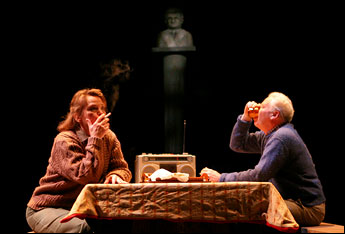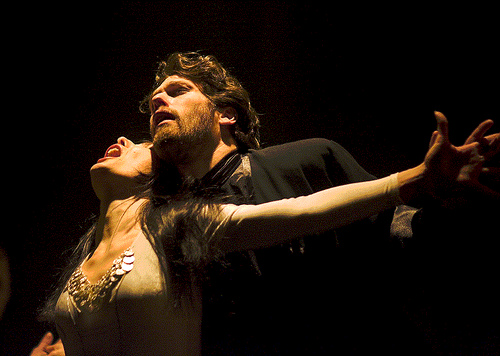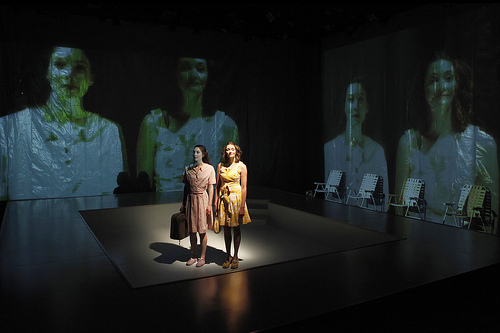|
JACQUELINE LAWTON: Why did you decide to get into theatre? Was there someone or a particular show that inspired you?
HANNAH HESSEL: I’ve been in theatre for longer than I can remember. I think I owe my interest to my older performer-of-a-sister and my very theatrically-educated parents for taking me to see Gilbert and Sullivan, Shakespeare and more during my childhood. Growing up in DC meant that having a theatrical education was easy. My first onstage experience came at Adventure Theatre summer camp, I grew up as a subscriber to the Shakespeare Theatre Company, and did summers there and at Theater Lab. JL: How do you define dramaturgy? Or explain to people the work that you do? HH: I think I say something different every time, or I laugh the question off. The problem is that it is different every time. With my full-time work at the Shakespeare Theatre Company I find ways to bridge and intensify connections between our audiences and our work. With Forum Theatre: I work to maintain our values of artistry, community and wonder. The work that I do with the Project Gym helps to artists to find sustainable creativity through collaboration and skill building. And I also work with individual artists to provide an extra creative eye or analysis on the work they are building. I fully believe all of that uses the skills of dramaturgy but I have no idea how I would fit them into a single job explanation. And I don’t know if they would accurately reflect any other dramaturg’s definition. JL: How long have you lived and worked as a dramaturg in DC? What brought you here? Why have you stayed? HH: Although a native of DC, I started working here professionally directly after finishing undergrad at Sarah Lawrence College. Beginning as an intern at Theater J, I stayed for five years combining my love of Jewish history and culture with my love of theater. At Theater J I grew as an artist and a dramaturg and in that time I also made strong connections with the larger DC arts community. I left for three years to pursue an MFA in Dramaturgy from Columbia University. Being in New York gave me the opportunity to see a tremendous amount of amazing work and meet a remarkable number of amazing artists. The time energized me for moving back to the district. I hope to stay and be a part of making DC as vibrant of an arts and theater community as possible. JL: If your work as a dramaturg doesn’t pay the bills, what else do you do? How do you balance this work with your dramaturgy? HH: I’ve been extremely lucky to make a living through dramaturgy my entire professional career. However, like many people in this field that living is small and my time is divided between many different programs. In addition to my full time job (40+ hours a week), I put in a couple hours a week towards Forum Theatre and about 15 hours a week into my fledgling company The Project Gym. It’s a busy and sometimes maddening life but I love it all. JL: What skills and traits do you feel a successful dramaturg should have to support the development of a new play or a production? HH: So many but here are a few…
JL: What is the greatest part of being a dramaturg? What has been your most difficult challenge? HH: The greatest part is being able to interact and be inspired by a wide range of artists. The most difficult part is the frustration of being in a field that hasn’t figured out how to articulate its relevance to the culture at large. Because of this, issues of mismanagement and lack of forward thinking, our field feels like it’s lagging behind both artistically and financially. I know there are many people working to counter this, so I refuse to give up hope that someday theater can be an important part of all citizens’ lives. JL: Who are your favorite playwrights? What is it about their work that inspires or draws you to them? HH: There are many generative artists who I’m drawn to by their passion, aesthetic and refusal to answer all the questions. The list would be long so here are three very different writers whose work I keep returning to: Caryl Churchill always challenges me and I love that she considers how the structure affects the storytelling. In doing so, each play is crafted into its own unique experience. Tennessee Williams will always be a favorite of mine. I started reading, and sobbing, over his work at a young age and still his stories of desperation and longing for connection touch me to my core. And DC’s very own Stephen Spotswood, because I’d feel terrible if I didn’t mention our local folks. Stephen’s work, in addition to tackling interesting and complicated topics, always impresses me with its use of language and rhythm. JL: DC audiences are ... HH: So incredibly smart. Don’t try to pull anything over on our audiences, it won’t work. JL: DC actors, designers and directors are .. HH: Eager to collaborate. I’ve been overwhelmed by the interest in the Project Gym from all sectors of the DC theater community. People want to come together, learn from and be inspired by each other. JL: DC playwrights are … HH: Hungry. Over the past few years, I’ve been amazed how much stronger the playwrighting community has become and despite increased opportunities it is never enough to feed them. It’s an exciting place to be, and I hope more opportunities will rise. JL: DC critics are ... HH: This is a hard one. I think all our critics mean well and want a successful community. I sometimes get sad about the current state of arts criticism both in terms of opportunity and professionalism, but that’s a longer story. JL: How do you feel the DC theatre community has addressed the issues of race and gender parity? How has this particular issue impacted you and your ability to get your work produced on the main stages? HH: We are lucky in this city to have some strong personalities who will always stand up for what is just and right. We are a city that doesn’t back down from arguments. I love this about DC. We haven’t reached any amount of parity. I will say some theaters are doing better than others; they keep it at the front of conversations and try to incorporate it in decision making. One of the things that I love about Forum Theatre is that we want to have the conversation. We noticed a problem within our own season and addressed it. Beyond addressing it, we pulled together members from the community to talk specifically about issues facing female playwrights. And we are currently discussing the best time to have a similar conversation about race. These are conversations that NEED to happen, and keep happening until there is no longer an issue. JL: What advice do you have for an up and coming DC based dramaturg who has just moved to D.C.? HH: Find kindred spirits. Have a group of artists that you always love talking to and working with. Have friends outside of theater. Read. Talk. See. (Attend Project Gym) Don’t put yourself in a box by what someone has told you dramaturgy is. Use your tools how you see fit. JL: What's next for you? Where can we keep up with your work? HH: In the next few months I’ll be leading a number of discussions at STC including a symposium about our productions of Shakespeare’s Coriolanus and Schiller’s Wallenstein (adapted by poet Robert Pinsky, who will be in attendance) on Sunday, April 28. The plays are complicated and feel very urgent given the current state of our military. And if you work in the Penn Quarter area you should come to the weekly performance series I curate, Happenings at the Harman! At Forum I will be working on Clementine in the Lower Nine and our upcoming Natsu Power’s directed devised piece that will go up in the summer. You can find out more about Project Gym at theprojectgym.wordpress.com. You can follow me on twitter: @hanvnah Oh, and I’m planning a wedding, so there’s that.
2 Comments
It's always a pleasure to hear Hannah's incisive and wise comments (how did one so young get so wise?). But, as an old-fashioned scrooge of sorts, when did dramaturge drop its e? Or is the g now pronounced hard as in grammar? I would hope it's still soft, spoken tripplingly on the tongue :-)
Reply
Jacqueline Lawton
4/19/2013 12:56:27 am
Thanks so much for your comment and question! Dramaturge is the French word for playwright. I suspect that's why we drop the "e."
Reply
Your comment will be posted after it is approved.
Leave a Reply. |
My BlogI'm a playwright, dramaturg, and teaching artist. It is here where you'll find my queries and musings on life, theater and the world. My posts advocate for diversity, inclusion, and equity in the American Theatre and updates on my own work. Please enjoy!
Categories
All
Archives
June 2020
Reading List
|



